- Home
- Robert Hugh Benson
By What Authority? Page 7
By What Authority? Read online
Page 7
CHAPTER VI
MR. STEWART
Sir Nicholas' exclamatory sentence was no exaggeration. That terriblechoice of which he spoke, with his old eyes shining with the desire tomake it, did not indeed come so immediately as he anticipated; but itcame none the less. From every point of view the Bull was unfortunate,though it may have been a necessity; for it marked the declaration of warbetween England and the Catholic Church. A gentle appeal had been triedbefore; Elizabeth, who, it must be remembered had been crowned duringmass with Catholic ceremonial, and had received the Blessed Sacrament,had been entreated by the Pope as his "dear daughter in Christ" to returnto the Fold; and now there seemed to him no possibility left but thisultimatum.
It is indeed difficult to see what else, from his point of view, he couldhave done. To continue to pretend that Elizabeth was his "dear daughter"would have discredited his fatherly authority in the eyes of the wholeChristian world. He had patiently made an advance towards his waywardchild; and she had repudiated and scorned him. Nothing was left but torecognise and treat her as an enemy of the Faith, an usurper of spiritualprerogatives, and an apostate spoiler of churches; to do this mightcertainly bring trouble upon others of his less distinguished but moreobedient children, who were in her power; but to pretend that thesuffering thus brought down upon Catholics was unnecessary, and that thePope alone was responsible for their persecution, is to be blind to thefact that Elizabeth had already openly defied and repudiated hisauthority, and had begun to do her utmost to coax and compel his childrento be disobedient to their father.
The shock of the Bull to Elizabeth was considerable; she had not expectedthis extreme measure; and it was commonly reported too that France andSpain were likely now to unite on a religious basis against England; andthat at least one of these Powers had sanctioned the issue of the Bull.This of course helped greatly to complicate further the alreadycomplicated political position. Steps were taken immediately tostrengthen England's position against Scotland with whom it was now, morethan ever, to be feared that France would co-operate; and the ChannelFleet was reinforced under Lord Clinton, and placed with respect toFrance in what was almost a state of war, while it was already in aninformal state of war with Spain. There was fierce confusion in the PrivyCouncil. Elizabeth, who at once began to vacillate under the combinedthreats of La Mothe, the French ambassador, and the arguments of thefriend of Catholics, Lord Arundel, was counter-threatened with ruin byLord Keeper Bacon unless she would throw in her lot finally with theProtestants and continue her hostility and resistance to the CatholicScotch party. But in spite of Bacon Elizabeth's heart failed her, and ifit had not been for the rashness of Mary Stuart's friends, LordSouthampton and the Bishop of Ross, the Queen might have been induced tosubstitute conciliation for severity towards Mary and the Catholic partygenerally. Southampton was arrested, and again there followed the furtherencouragement of the Protestant camp by the rising fortunes of theHuguenots and the temporary reverses to French Catholicism; so thependulum swung this way and that. Elizabeth's policy changed almost fromday to day. She was tormented with temporal fears of a continentalcrusade against her, and by the spiritual terrors of the Pope's Bull; andher unfathomable fickleness was the despair of her servants.
Meanwhile in the religious world a furious paper war broke out; andvolleys from both sides followed the solemn roar and crash of _Regnansin Excelsis_.
But while the war of words went on, and the theological assaults andcharges were given and received, repulsed or avoided, something practicalmust, it was felt, be done immediately; and search was made high and lowfor other copies of the Bull. The lawyers in the previous year had fallenunder suspicion of religious unsoundness; judges could not be trusted toconvict Catholics accused of their religion; and counsel was unwilling toprosecute them; therefore the first inquisition was made in the Inns ofCourt; and almost immediately a copy of the Bull was found in the room ofa student in Lincoln's Inn, who upon the rack in the Tower confessed thathe had received it from one John Felton, a Catholic gentleman who livedupon his property in Southwark. Upon Felton's arrest (for he had notattempted to escape) he confessed immediately, without pressure, that hehad affixed the Bull to the Bishop of London's gate; but although he wasracked repeatedly he would not incriminate a single person besideshimself; but at his trial would only assert with a joyous confidence thathe was not alone; and that twenty-five peers, six hundred gentlemen, andthirty thousand commoners were ready to die in the Holy Father's quarrel.He behaved with astonishing gallantry throughout, and after hiscondemnation had been pronounced upon the fourth of August at theGuildhall, on the charge of high-treason, he sent a diamond ring from hisown finger, of the value of L400, to the Queen to show that he bore herno personal ill-will. He had been always a steadfast Catholic; his wifehad been maid of honour to Mary and a friend of Elizabeth's. On Augustthe eighth he suffered the abominable punishment prescribed; he was drawnon a hurdle to the gate of the Bishop's palace in S. Paul's Churchyard,where he had affixed the Bull, hanged upon a new gallows, cut down beforehe was unconscious, disembowelled and quartered. His name has since beenplaced on the roll of the Blessed by the Apostolic See in whose quarrelhe so cheerfully laid down his life.
News of these and such events continued of course to be eagerly soughtafter by the Papists all over the kingdom; and the Maxwells down at GreatKeynes kept in as close touch with the heart of affairs as almost anyprivate persons in the kingdom out of town. Sir Nicholas was one of thosefiery natures to whom opposition or pressure is as oil to flame. He beganat once to organise his forces and prepare for the struggle that wasbound to come. He established first a kind of private post to London andto other Catholic houses round; for purposes however of defence ratherthan offence, so that if any steps were threatened, he and his friendsmight be aware of the danger in time. There was great sorrow at the newsof John Felton's death; and mass was said for his soul almost immediatelyin the little oratory at Maxwell Court by one of the concealed priestswho went chiefly between Hampshire and Sussex ministering to theCatholics of those districts. Mistress Margaret spent longer than ever ather prayers; Lady Maxwell had all she could do to keep her husband fromsome furious act of fanatical retaliation for John Felton's death--someuseless provocation of the authorities; the children at the Dower Housebegan to come to the Hall less often, not because they were lesswelcomed, but because there was a constraint in the air. All seemedpreoccupied; conversations ceased abruptly on their entrance, and fits ofabstraction would fall from time to time upon their kindly hosts. In themeanwhile, too, the preparations for James Maxwell's departure, which hadalready begun to show themselves, were now pushed forward rapidly; andone morning in the late summer, when Isabel came up to the Hall, shefound that Lady Maxwell was confined to her room and could not be seenthat day; she caught a glimpse of Sir Nicholas' face as he quicklycrossed the entrance hall, that made her draw back from daring to intrudeon such grief; and on inquiry found that Mr. James had ridden away thatmorning, and that the servants did not know when to expect him back, norwhat was his destination.
In other ways also at this time did Sir Nicholas actively help on hisparty. Great Keynes was in a convenient position and circumstances foragents who came across from the Continent. It was sufficiently nearLondon, yet not so near to the highroad or to London itself as to makedisturbance probable; and its very quietness under the spiritual care ofa moderate minister like Mr. Dent, and its serenity, owing to the secretsympathy of many of the villagers and neighbours, as well as from thepersonal friendship between Sir Nicholas and the master of the DowerHouse--an undoubted Protestant--all these circumstances combined to makeMaxwell Hall a favourite halting-place for priests and agents from theContinent. Strangers on horseback or in carriages, and sometimes even onfoot, would arrive there after nightfall, and leave in a day or two forLondon. Its nearness to London enabled them to enter the city at any hourthey thought best after ten or eleven in the forenoon. They came on ve
ryvarious businesses; some priests even stayed there and made the Hall acentre for their spiritual ministrations for miles round; others camewith despatches from abroad, some of which were even addressed to greatpersonages at Court and at the Embassies where much was being done by theAmbassadors at this time to aid their comrades in the Faith, and to otherleading Catholics; and others again came with pamphlets printed abroadfor distribution in England, some of them indeed seditious, but many ofthem purely controversial and hortatory, and with other devotionalarticles and books such as it was difficult to obtain in England, andmight not be exposed for public sale in booksellers' shops: Agnus Deis,beads, hallowed incense and crosses were being sent in large numbers fromabroad, and were eagerly sought after by the Papists in all directions.It was remarkable that while threatening clouds appeared to be gatheringon all sides over the Catholic cause, yet the deepening peril wasaccompanied by a great outburst of religious zeal. It was reported to theArchbishop that "massing" was greatly on the increase in Kent; and wasattributed, singularly enough, to the Northern Rebellion, which had endedin disaster for the Papists; but the very fact that such a movement couldtake place at all probably heartened many secret sympathisers, who hadhitherto considered themselves almost alone in a heretic population.
Sir Nicholas came in one day to dinner in a state of great fury. One ofhis couriers had just arrived with news from London; and the old man camein fuming and resentful.
"What hypocrisy!" he cried out to Lady Maxwell and Mistress Margaret, whowere seated at table. "Not content with persecuting Catholics, they willnot even allow us to say we are persecuted for the faith. Here is theLord Keeper declaring in the Star Chamber that no man is to be persecutedfor his private faith, but only for his public acts, and that the Queen'sGrace desires nothing so little as to meddle with any man's conscience.Then I suppose they would say that hearing mass was a public act andtherefore unlawful; but then how if a man's private faith bids him tohear mass? Is not that meddling with his private conscience to forbid himto go to mass? What folly is this? And yet my Lord Keeper and her Graceare no fools! Then are they worse than fools?"
Lady Maxwell tried to quiet the old man, for the servants were not out ofthe room; and it was terribly rash to speak like that before them; but hewould not be still nor sit down, but raged up and down before the hearth,growling and breaking out now and again. What especially he could not getoff his mind was that this was the Old Religion that was prescribed. ThatEngland for generations had held the Faith, and that then the Faith andall that it involved had been declared unlawful, was to him iniquityunfathomable. He could well understand some new upstart sect beingpersecuted, but not the old Religion. He kept on returning to this.
"Have they so far forgotten the Old Faith as to think it can be held in aman's private conscience without appearing in his life, like theirmiserable damnable new fangled Justification by faith without works? Orthat a man can believe in the blessed sacrament of the altar and yet notdesire to receive it; or in penance and yet not be absolved; or in Peterand yet not say so, nor be reconciled. You may believe, say they, oftheir clemency, what you like; be justified by that; that is enough!Bah!"
However mere declaiming against the Government was barren work, and SirNicholas soon saw that; and instead, threw himself with more vigour thanever into entertaining and forwarding the foreign emissaries.
Mary Corbet had returned to London by the middle of July; and Hubert wasnot yet returned; so Sir Nicholas and the two ladies had the Hall tothemselves. Now it must be confessed that the old man had neither thenature nor the training for the _role_ of a conspirator, even of themildest description. He was so exceedingly impulsive, unsuspicious andpassionate that it would have been the height of folly to entrust himwith any weighty secret, if it was possible to dispense with him; but theCatholics over the water needed stationary agents so grievously; and SirNicholas' name commanded such respect, and his house such conveniences,that they overlooked the risk involved in making him their confidant,again and again; besides it need not be said that his honour and fidelitywas beyond reproach; and those qualities after all balance favourablyagainst a good deal of shrewdness and discretion. He, of course, wasserenely unable to distinguish between sedition and religion; andentertained political meddlers and ordinary priests with an equalenthusiasm. It was pathetic to Lady Maxwell to see her simple old husbandshuffling away his papers, and puzzling over cyphers and perpetuallyleaving the key of them lying about, and betraying again and again whenhe least intended it, by his mysterious becks and nods and glances andoracular sayings, that some scheme was afoot. She could have helped himconsiderably if he had allowed her; but he had an idea that thecapacities of ladies in general went no further than their harps, theirembroidery and their devotions; and besides, he was chivalrouslyunwilling that his wife should be in any way privy to business thatinvolved such risks as this.
One sunny morning in August he came into her room early just as she wasfinishing her prayers, and announced the arrival of an emissary fromabroad.
"Sweetheart," he said, "will you prepare the east chamber for a young manwhom we will call Mr. Stewart, if you please, who will arrive to-night.He hopes to be with us until after dusk to-morrow when he will leave; andI shall be obliged if you will---- No, no, my dear. I will order thehorses myself."
The old man then bustled off to the stableyard and ordered a saddle-horseto be taken at once to Cuckfield, accompanied by a groom on anotherhorse. These were to arrive at the inn and await orders from a stranger"whom you will call Mr. Stewart, if you please." Mr. Stewart was tochange horses there, and ride on to Maxwell Hall, and Sir Nicholasfurther ordered the same two horses and the same groom to be ready thefollowing evening at about nine o'clock, and to be at "Mr. Stewart's"orders again as before.
This behaviour of Sir Nicholas' was of course most culpably indiscreet. Achild could not but have suspected something, and the grooms, who were ofcourse Catholics, winked merrily at one another when the conspirator'sback was turned, and he had hastened in a transport of zeal andpreoccupation back again to the house to interrupt his wife in herpreparations for the guest.
That evening "Mr. Stewart" arrived according to arrangements. He was aslim red-haired man, not above thirty years of age, the kind of man hisenemies would call foxy, with a very courteous and deliberate manner, andhe spoke with a slight Scotch accent. He had the air of doing everythingon purpose. He let his riding-whip fall as he greeted Lady Maxwell in theentrance hall; but picked it up with such a dignified grace that youwould have sworn he had let it fall for some wise reason of his own. Hehad a couple of saddle-bags with him, which he did not let out of hissight for a moment; even keeping his eye upon them as he met the ladiesand saluted them. They were carried up to the east chamber directly,their owner following; where supper had been prepared. There was no realreason, since he arrived with such publicity, why he should not havesupped downstairs, but Sir Nicholas had been peremptory. It was by hisdirections also that the arrival had been accomplished in the manner ithad.
After he had supped, Sir Nicholas receiving the dishes from the servants'hands at the door of the room with the same air of secrecy and despatch,his host suggested that he should come to Lady Maxwell's drawing-room, asthe ladies were anxious to see him. Mr. Stewart asked leave to bring alittle valise with him that had travelled in one of the bags, and thenfollowed his host who preceded him with a shaded light along the gallery.
When he entered he bowed again profoundly, with a slightly French air, tothe ladies and to the image over the fire; and then seated himself, andasked leave to open his valise. He did so with their permission, anddisplayed to them the numerous devotional articles and books that itcontained. The ladies and Sir Nicholas were delighted, and set aside atonce some new books of devotion, and then they fell to talk. TheNetherlands, from which Mr. Stewart had arrived two days before, on theeast coast, were full at this time of Catholic refugees, under the Dukeof Alva's protection. Here they had been living, some of them even fromEliz
abeth's accession, and Sir Nicholas and his ladies had many inquiriesto make about their acquaintances, many of which Mr. Stewart was able tosatisfy, for, from his conversation he was plainly one in the confidenceof Catholics both at home and abroad. And so the evening passed awayquietly. It was thought better by Sir Nicholas that Mr. Stewart shouldnot be present at the evening devotions that he always conducted for thehousehold in the dining-hall, unless indeed a priest were present to takehis place; so Mr. Stewart was again conducted with the same secrecy tothe East Chamber; and Sir Nicholas promised at his request to look in onhim again after prayers. When prayers were over, Sir Nicholas went up tohis guest's room, and found him awaiting him in a state of evidentexcitement, very unlike the quiet vivacity and good humour he had shownwhen with the ladies.
"Sir Nicholas," he said, standing up, as his host came in, "I have nottold you all my news." And when they were both seated he proceeded:
"You spoke a few minutes ago, Sir Nicholas, of Dr. Storey; he has beencaught."
The old man exclaimed with dismay. Mr. Stewart went on:
"When I left Antwerp, Sir Nicholas, Dr. Storey was in the town. I saw himmyself in the street by the Cathedral only a few hours before I embarked.He is very old, you know, and lame, worn out with good works, and he washobbling down the street on the arm of a young man. When I arrived atYarmouth I went out into the streets about a little business I had with abookseller, before taking horse. I heard a great commotion down near thedocks, at the entrance of Bridge Street; and hastened down there; andthere I saw pursuivants and seamen and officers all gathered about acarriage, and keeping back the crowd that was pressing and crying out toknow who the man was; and presently the carriage drove by me, scatteringthe crowd, and I could see within; and there sat old Dr. Storey, verywhite and ill-looking, but steady and cheerful, whom I had seen the veryday before in Antwerp. Now this is very grievous for Dr. Storey; and Ipray God to deliver him; but surely the Duke and the King of Spain mustmove now. They cannot leave him in Cecil's hands; and then, Sir Nicholas,we must all be ready, for who knows what may happen."
Sir Nicholas was greatly moved. There was one of the perplexities whichso much harassed all the Papists at this time. It seemed certain that Mr.Stewart's prediction must be fulfilled. Dr. Storey was a naturalisedsubject of King Philip and in the employment of Alva, and he had beencarried off forcibly by the English Government. It afterwards came outhow it had been done. He had been lured away from Antwerp and enticed onboard a trader at Bergen-op-Zoom, by Cecil's agents with the help of atraitor named Parker, on pretext of finding heretical books therearriving from England; and as soon as he had set foot on deck he washurried below and carried straight off to Yarmouth. Here then was SirNicholas' perplexity. To welcome Spain when she intervened and to workactively for her, was treason against his country; to act against Spainwas to delay the re-establishment of the Religion--something thatappeared to him very like treason against his faith. Was the dreadfulchoice between his sovereign and his God, he wondered as he paced up anddown and questioned Mr. Stewart, even now imminent?
The whole affair, too, was so formidable and so mysterious that thehearts of these Catholics and of others in England when they heard thetale began to fail them. Had the Government then so long an arm and sokeen an eye? And if it was able to hale a man from the shadow of theCathedral at Antwerp and the protection of the Duke of Alva into thehands of pursuivants at Yarmouth within the space of a few hours, whothen was safe?
And so the two sat late that night in the East Chamber; and laid schemesand discussed movements and probabilities and the like, until the dawnbegan to glimmer through the cracks of the shutters and the birds tochirp in the eaves; and Sir Nicholas at last carried to bed with him ananxious and a heavy heart. Mr. Stewart, however, did not seem so greatlydisturbed; possibly because on the one side he had not others dearer tohim than his own life involved in these complex issues: and partlybecause he at any rate has not the weight of suspense and indecision thatso drew his host two ways at once, for Mr. Stewart was whole-heartedlycommitted already, and knew well how he would act should the choicepresent itself between Elizabeth and Philip.
The following morning Sir Nicholas still would not allow his guest tocome downstairs, and insisted that all his meals should be served in theEast Chamber, while he himself, as before, received the food at the doorand set it before Mr. Stewart. Mr. Stewart was greatly impressed andtouched by the kindness of the old man, although not by his capacity forconspiracy. He had intended indeed to tell his host far more than he haddone of the movements of political and religious events, for he could notbut believe, before his arrival, that a Catholic so prominent andinfluential as Sir Nicholas was becoming by reputation among the refugeesabroad, was a proper person to be entrusted even with the highestsecrets; but after a very little conversation with him the night before,he had seen how ingenuous the old man was, with his laughable attempts atsecrecy and his lamentable lack of discretion; and so he had contentedhimself with general information and gossip, and had really told SirNicholas very little indeed of any importance.
After dinner Sir Nicholas again conducted his guest to the drawing-room,where the ladies were ready to receive him. He had obtained Mr. Stewart'spermission the night before to tell his wife and sister-in-law the newsabout Dr. Storey; and the four sat for several hours together discussingthe situation. Mr. Stewart was able to tell them too, in greater detail,the story of Lord Sussex's punitive raid into Scotland in the precedingApril. They had heard of course the main outline of the story with thekind of embroideries attached that were usual in those days of inaccuratereporting; but their guest was a Scotchman himself and had had thestories first-hand in some cases from those rendered homeless by theraid, who had fled to the Netherlands where he had met them. Briefly theraid was undertaken on the pretended plea of an invitation from the"King's men" or adherents of the infant James; but in reality to chastiseScotland and reduce it to servility. Sussex and Lord Hunsdon in the east,Lord Scrope on the west, had harried, burnt, and destroyed in the wholecountryside about the Borders. Especially had Tiviotdale suffered.Altogether it was calculated that Sussex had burned three hundredvillages and blown up fifty castles, and forty more "strong houses," someof these latter, however, being little more than border peels. Mr.Stewart's accounts were the more moving in that he spoke in a quietdelicate tone, and used little picturesque phrases in his speech.
"Twelve years ago," said Mr. Stewart, "I was at Branxholme myself. It wasa pleasant house, well furnished and appointed; fortified, too, as allneed to be in that country, with sheaves of pikes in all the lower rooms,and Sir Walter Scott gave me a warm welcome, for I was there on abusiness that pleased him. He showed me the gardens and orchards, allgreen and sweet, like these of yours, Lady Maxwell. And it seemed to me ahome where a man might be content to spend all his days. Well, my LordSussex has been a visitor there now; and what he has left of the housewould not shelter a cow, nor what is left of the pleasant gardens sustainher. At least, so one of the Scots told me whom I met in the Netherlandsin June."
He talked, too, of the extraordinary scenes of romance and chivalry inwhich Mary Queen of Scots moved during her captivity under Lord Scrope'scare at Bolton Castle in the previous year. He had met in his travels inFrance one of her undistinguished adherents who had managed to get aposition in the castle during her detention there.
"The country was alive with her worshippers," said Mr. Stewart. "Theyswarmed like bees round a hive. In the night voices would be heard cryingout to her Grace out of the darkness round the castle; and when theguards rode out they would find no man but maybe hear just a laugh ortwo. Her men would lie out at night and watch her window (for she wouldnever go to rest till late), and pray towards it as if it were a lightbefore the blessed sacrament. When she rode out a-hunting, with herguards of course about her, and my Lord Scrope or Sir Francis Knollysnever far away, a beggar maybe would be sitting out on the road and askan alms; and cry out 'God save your Grace'; but he would be a begga
r whowas accustomed to wear silk next his skin except when he went a-begging.Many young gentlemen there were, yes and old ones too, who would thankGod for a blow or a curse from some foul English trooper for his meat, ifonly he might have a look from the Queen's eyes for his grace beforemeat. Oh! they would plot too, and scheme and lie awake half the nightspinning their webs, not to catch her Grace indeed, but to get her awayfrom that old Spider Scrope; and many's the word and the scrap of paperthat would go in to her Grace, right under the very noses of my LordScrope and Sir Francis themselves, as they sat at their chess in theQueen's chamber. It's a long game of chess that the two Queens areplaying; but thank our Lady and the Saints it's not mate yet--not mateyet; and the White Queen will win, please God, before the board'sover-turned."
And he told them, too, of the failure of the Northern Rebellion, and thewretchedness of the fugitives.
"They rode over the moors to Liddisdale," he said, "ladies and all, inbitter weather, wind and snow, day after day, with stories of Clinton'stroopers all about them, and scarcely time for bite or sup or sleep. Mylady Northumberland was so overcome with weariness and sickness that shecould ride no more at last, and had to be left at John-of-the-Side'shouse, where she had a little chamber where the snow came in at onecorner, and the rats ran over my lady's face as she lay. My LordsNorthumberland and Westmoreland were in worse case, and spent theirChristmas with no roof over them but what they could find out in thebraes and woods about Harlaw, and no clothes but the foul rags that somebeggar had thrown away, and no food but a bird or a rabbit that theycould pick up here and there, or what their friends could get to them nowand again privately. And then my Lord Northumberland's little daughterswhom he was forced to leave behind at Topcliff--a sweet Christmas theyhad! Their money and food was soon spent; they could have scarcely a firein that bitter hard season; and God who feeds the ravens alone knows howthey were sustained; and for entertainment to make the time pass merrily,all they had was to see the hanging of their own servants in scores aboutthe house, who had served them and their father well; and all their musicat night was the howling of the wind in those heavily ladenChristmas-trees, and the noise of the chains in which the men werehanged."
Mr. Stewart's narratives were engrossing to the two ladies and SirNicholas. They had never come so close to the struggles of the Catholicsin the north before; and although the Northern Rebellion had ended sodisastrously, yet it was encouraging, although heartbreaking too, to hearthat delicate women and children were ready gladly to suffer suchmiseries if the religious cause that was so dear to them could be therebyhelped. Sir Nicholas, as has been said, was in two minds as to thelawfulness of rising against a temporal sovereign in defence of religiousliberties. His whole English nature revolted against it, and yet so manyspiritual persons seemed to favour it. His simple conscience wasperplexed. But none the less he could listen with the most intenseinterest and sympathy to these tales of these co-religionists of his own,who were so clearly convinced of their right to rebel in defence of theirfaith.
And so with such stories the August afternoon passed away. It was athundery day, which it would have been pleasanter to spend in the garden,but that, Sir Nicholas said, under the circumstances was not to bethought of; so they threw the windows wide to catch the least breath ofair; and the smell of the flower-garden came sweetly up and flooded thelow cool room; and so they sat engrossed until the evening.
Supper was ordered for Mr. Stewart at half-past seven o'clock; and thismeal Sir Nicholas had consented should be laid downstairs in his ownprivate room opening out of the hall, and that he and his ladies shouldsit down to table at the same time. Mr. Stewart went to his room an hourbefore to dress for riding, and to superintend the packing of hissaddle-bags; and at half-past seven he was conducted downstairs by SirNicholas who insisted on carrying the saddle-bags with his own hands, andthey found the two ladies waiting for them in the panelled study that hadone window giving upon the terrace that ran along the south of the houseabove the garden. When supper had been brought in by Sir Nicholas' ownbody-servant, Mr. Boyd, they sat down to supper after a grace from SirNicholas. The horses were ordered for nine o'clock.

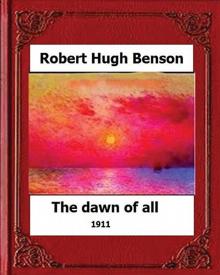 The Dawn of All
The Dawn of All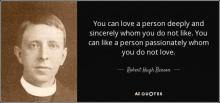 By What Authority?
By What Authority?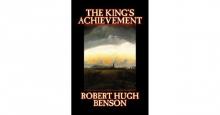 The King's Achievement
The King's Achievement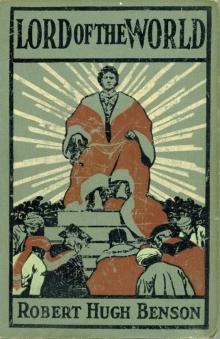 Lord of the World
Lord of the World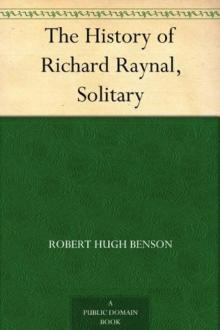 The History of Richard Raynal, Solitary
The History of Richard Raynal, Solitary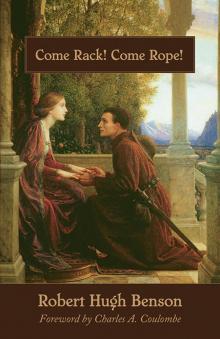 Come Rack, Come Rope
Come Rack, Come Rope